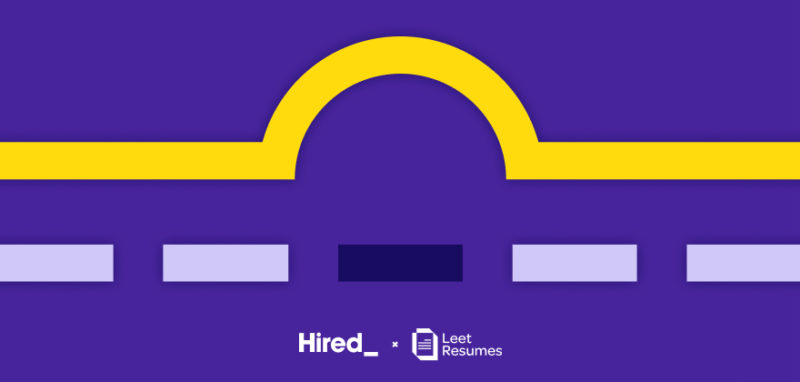
How to Answer the Top 10 Most Common Interview Questions
Never be stumped by the top 10 most common interview questions again! Interviewing can be intimidating. In fact, most working adults would rather get a root canal than look for a job. But it doesn’t have to be so painful! As you become more familiar with the most common types of interview questions, the easier it becomes to shape responses to allow your best self to come through.
To provide the most well-rounded interview guide, we surveyed dozens of active Hired candidates who were in the midst of their interview process to find out what they thought were the most challenging questions.
We realize the interview process is dynamic and so we wanted to drill down on not only what the most common questions are but the reasoning behind why you were being asked the question in the first place.
Ultimately, the best way to utilize this resource is to put it into action. Meet up with a friend and have a mock interview or go through the questions yourself; regardless of what you choose the important thing is to jump in and practice.
1. “Tell me about yourself.”Sounds simple enough — who doesn’t want to talk about themselves? Well, this interview question is a window of opportunity if approached strategically. To deftly and quickly answer this question in your favor, you’ll have to know what they are looking to learn about you by asking this question. Candidates often begin rambling about anything and everything that comes to mind without first thinking about the true intention of the question.
A simple response that will reflect professionalism to the initial question is “Where would you like for me to start?” By allowing the interviewer to provide some guidance as to what specifically they’d like to know, it prevents you from rambling and gives you the direction you’ll need to deliver an impressive answer.
The response you may hear is “Let’s start with your relevant experience.” Since the interviewer has narrowed down the scope of the question, you’re then able to provide a useful, compelling answer relevant to your audience.
The key to answering successfully is to provide specific details about what you have done in your past that may relate to what you know they are doing as well.
For example, if they ask you to start with your career from the beginning and you know that they are looking to hire you for a ruby development role it would be wise to begin speaking about how you learned ruby and where and how you have grown since.
Pro tip:
If possible, always keep your answers relevant to the position you are seeking. It’ll help provide additional context around how you will add value to the role.
Related: How to Answer “Tell Me About Yourself” Confidently for Sales & CX Roles and How to Answer “Tell Me About Yourself” Interview Question for Tech Talent
2. “Why are you interested in this opportunity?”This interview question can be a challenging one, despite sounding seemingly straightforward. The interviewer is looking to see if you’ve done one thing: research. Have you taken the time to really dive deep into what they are all about and how your role would be contributing to their larger mission.
Your genuine passion for the company, mission, industry, and product are all essential components of a hiring manager’s assessment of your overall candidacy.
Without passion for the company, most hiring managers will pass on a candidate. Some great places to start your research are Crunchbase, Mattermark, or Hired’s own Company Directory, to get informed and feel comfortable addressing the company.
Pro tip:
In addition to researching the overall company, it’s valuable to know who is interviewing you. Becoming familiar with their career path and current role may be useful while you’re answering questions and aiming to build rapport.
3. “What are your salary expectations?”Brace yourself! Regardless of when you want to address your salary expectations, they will come up sooner rather than later, so be prepared. In some cases, it’s asked during your initial phone screen by the recruiting manager. Other times it’s addressed during an onsite (further along in the interview process).
To make sure you set yourself up for success, it is critical to phrase your response in a particular way in order to set expectations if/when you get to the offer stage.
To come up with a suitable number, a few things to consider are: salary on your Hired profile, your current salary, cost of living (or the city you’ll be moving to), relocation, and commute. The best approach is to be honest about your expectation while providing a range you’re comfortable with (leaving a nice buffer).
Pro tip:
If possible, avoid providing a concrete number. It’s always best to not allow them to be scared away with a number. Also, if you are unsure about the roles’ responsibilities or scope, you don’t want to regret suggesting a number that you feel is too low.
This is one of the benefits of being on the Hired platform, for jobseekers in tech and sales. A lot of this information is transparent. When sending an interview request to a Hired candidate, for example, employers are required to submit a salary range.
Related: How to Negotiate Your Job Offer
4. “Why are you looking to leave your current company?”Even though you’re probably leaving your current job because you’re unhappy at some capacity with how things are going, the last thing employers want to hear is negativity. They figure if you so easily complain about your current employer, it’s just a matter of time until you do so about them as well. With that in mind, stay away from venting about your terrible boss, lack of compensation or how you simply don’t enjoy the work you do.
Instead, focus on three topics:
- What drew you to your current role.
- What’s changed since you began your role (remember to put a positive spin on it).
- Your ambitions moving forward.
This is a loaded interview question and your answer weighs heavily on their evaluation of you. (No pressure!) Having a strong understanding of what they want to know by asking this question helps frame the way you answer it.
Here’s what the interviewer is attempting to learn about you by asking this question:
- Are you reflective?
Self-awareness matters. Being aware of your strengths (as well as weaknesses) and areas of growth indicates you take time to reflect on the work that you do. In addition to identifying your skills in different areas, leveraging those core competencies will prove valuable as a professional. - Have you invested time in your areas of growth?
A key indicator of top candidates is whether they take initiative in addressing their career development. Employers want to make sure you’re not complacent about your skills ( or lack thereof in certain areas) and you take a proactive approach towards growing as a professional in your line of work. - Are you the right culture fit within the role and management structure?
Assessing your match within their current organization will be important for your long term success if you join their team. Although this doesn’t necessarily affect your day-to-day responsibilities, it’s important to consider a candidate’s strengths in relation to their potential manager. For example, if you have a growth area in upward management or communicating effectively with peers and the prospective manager also struggles with certain communication skills a hiring manager might realize that you might struggle to work with your prospective manager. They might need to hire a strong communicator even if this is not a core part of your day-to-day work.)
Pro tip:
When addressing your growth areas, make sure to articulate 2-3 ways you are working to improve your skills (shows you’re proactive). Be concrete and in-depth as you explain the action plan, it’ll feature your dedication to growth which is a competency companies often look for in candidates.
6. “Tell me about a time your work responsibilities got a little overwhelming. What did you do?”This is a great time to showcase your ability to prioritize tasks and your time management skills. Go ahead and pick a specific example where you had a lot on your plate and you had to stack rank what was most important to get done, and how you went about making that list. Be specific on where you were, what your role was, and how you handled it.
Example answer: “While I was working for X company, I was a Senior Software Engineer. We had a lot of major projects going on and I was responsible for my day-to-day duties at the same time.
In order for me to get all the work done that was needed, I had to take a step back to assess what tasks took priority over others and when I needed to get them done by.
I considered project timelines, project priority levels, and top daily priorities. I used this concept to start to build my list of tasks from top to bottom and work down from most important to not as important. If I needed help or a question answered I would be sure to ask.”
7. “Give me an example of a time when you had a difference of opinion with a team member. How did you handle that?”In the first part of your answer to this interview question, showcase a project you have worked on. Be descriptive about the project’s scope, but no need to go into detail — because the second half of this question should really be your main focus.
The way you handle a situation involving your colleagues reflects your approach in a work environment. In most cases, they want to be reassured that you have the right mindset in dealing with issues and can effectively problem solve.
Within your answer, convey that hearing the different opinions among your colleagues is important to you before you state how the differences were resolved. Emphasizing that coming up with the best outcome was done in a collaborative way will be important to the employer.
8. “Tell me about a challenge you faced recently in your role. How did you tackle it? What was the outcome?”Measuring a candidate’s problem-solving skills and how previous conflicts were successfully resolved in the past gives a great window into their overarching abilities to handle adversity. The most effective way to address the question is to follow a three-part formula:
- What went wrong? Provide context around the problem.
- What did you do about it? How were you proactive about finding a solution.
- What was the resolution? What was the outcome?
Since you’re highlighting your ability to handle challenges, spend the most time discussing the reasoning behind your actions.
It’s best to pick an example that highlights your problem-solving skills or shows that you learned a valuable lesson so that you could save the day if it ever happens again.
Example answer: “In my last job, we were all set to begin a project (provide a specific project) when everything that could go wrong, did. While some team members panicked and suggested a delay was inevitable, I suggested we all collect ourselves and lay out alternatives for each challenge.
We spent the morning taking action on alternatives and were able to start on schedule and set a realistic timeline. It turned into a very successful project (provide actual results).” This example reveals that you have poise under pressure and a problem-solving attitude in the face of challenges.”
9. “Where do you want to be in five years?”Joining a new team is an investment for both parties and they want to make sure it’ll be worth it long term. It sets the tone for how you envision yourself growing within your team and company.
A few factors to consider while shaping your answer:
- Set a realistic goal based on your experience and have expectations that align with that.
- Be ambitious. You don’t necessarily need a concrete plan of where you want to be but show your thought process.
- Does the position align with your goals and the possibility of growth within the company?
Use your answer to show you’re driven as well as a team player. The hiring manager will look for whether you’re going to stick around based on your answer while making an assessment on how long you may stay in the role.
Pro tip:
Simply stating that you’d like to be in your manager’s position in five years is not a great answer. Be thoughtful and show dedication to the role you’re interviewing for.
Example answer: “I’m really excited by this position at [company] because, in the next five years, I’d like to be seen as someone with deep expertise in the Tech event planning sector, and I know that’s something that I’ll have an opportunity to do here. I’m also really excited to take on more managerial responsibilities in the next few years and potentially even take the lead on some projects. I’ve been lucky enough to work with some amazing managers, and so developing into a great manager myself is something I’m really excited about.”
10. “Tell me about a time you needed information from someone who wasn’t responsive. What did you do?”When you hear this type of question, reflect on the company’s primary reason for asking it before you jump the gun. Your answer should address your communication skills and ability to overcome a challenging situation with a colleague.
Think of an example where you can speak to the importance of why you needed certain information and outline what you did to receive it. The hiring manager is looking to make sure you understand another’s perspective. For example, you can empathize they might have a lot on their plate, etc. Are you able to strongly communicate in order to still solicit the information?
Pro tip:
While you discuss the scenario, make sure to outline 2-3 steps you took in order to meet your goal.
Example answer: “I can think back to a time when I was working closely with an external partner on planning an event. I was trying to set the schedule for my team, however, it would sometimes take two weeks before the external partner would email me back.
I could definitely empathize with this because they mentioned they were managing multiple events. However, I also recognized it was slowing down the planning for my team.
First I would set a reminder for myself to follow up on my initial emails two days after I sent my first email.
Next, I determined setting up phone meetings might help the external partner communicate more information at once. This really helped in our ability to meet the deadlines we each needed.”
Common top interview questions are no longer a mysteryThink through these questions. If it’s easier for you to write your answers to gather your thoughts, do so. Avoid memorizing answers. These aren’t intended to be scripts, but a way for you to organize yourself. It’s important to be thoughtful in your answers but concise.
Ready to find your dream job? Employ your potential and see how Hired works for you.Hired Talent Advocates Michaela Osofsky and Wes Neece also contributed to this article. Originally published January 2017. Revised Oct. 29, 2021, Nov. 22, 2022.
Related blog posts

Ace the Interview & Get Your Questions Answered
Editor’s note: this is Part 2 in our series with our partner, Makers, “Build...

Curious about a Career in DevOps? How to Prep for Strong Interviews
Hired welcomes guest contributor Vyacheslav Nikitan, the Lead DevOps Trainer at NIX United, to...

Evaluate the Job & Negotiate the Job Offer You Deserve
Editor’s note: this is Part 3 in our series with our partner, Makers, “Build...

How to Handle an Employment Gap on Your Resume (Flip the Script!)
You’re not your work history Addressing an employment gap on a resume is one of the most...

How to Stand Out Behind the Screen: a Guide for Remote Candidates
Part of a Series: Setting yourself up for success as a remote candidate Editors note: this...

Recently Laid Off? A Jobseeker’s Guide to Bounce Back Better Than Ever
About this eBook If you’ve ever been laid off you know it’s often an emotional time full of...

